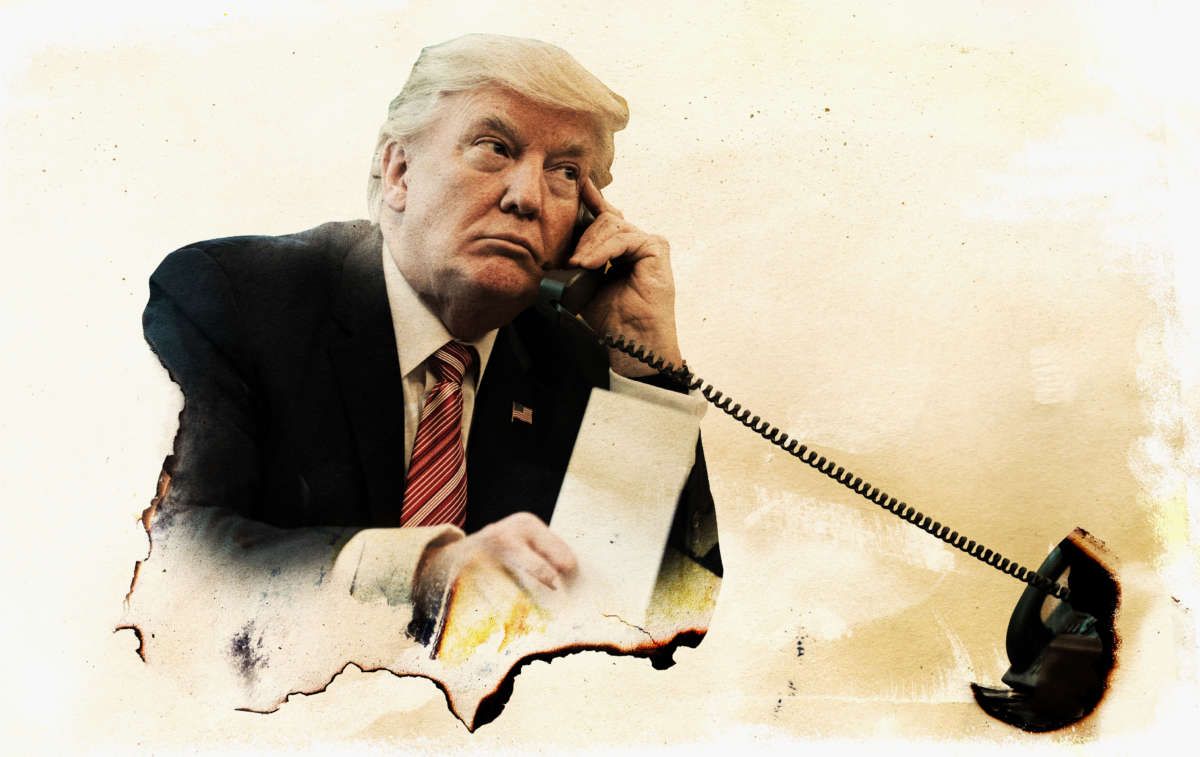President Donald Trump’s attempt to pressure Republican Georgia Secretary of State Brad Raffensperger to “find” him votes to help him win the state is an “impeachable offense,” according to a number of lawmakers, legal scholars and ethics organizations.
Trump has sought to overturn the outcomes of several states’ elections where he lost to President-elect Joe Biden in November’s presidential election. In a call Saturday with Raffensperger, Trump made a number of false claims about the election in Georgia, which he said warranted him being declared the winner of the state’s 16 Electoral College votes.
Tweeting about the call on Sunday morning, Trump said that Raffensperger “was unwilling, or unable, to answer questions such as the ‘ballots under table’ scam, ballot destruction, out of state ‘voters,’ dead voters, and more” — all claims that have no proof or veracity to them whatsoever.
“Respectfully, President Trump: What you’re saying is not true,” Raffensperger tweeted back to Trump. “The truth will come out.”
The entirety of the call was published later on Sunday by The Washington Post. During the call, Trump frequently encouraged Raffensperger to defy the will of Georgian voters, and to announce a result in the state’s presidential vote.
“The people of Georgia are angry, the people of the country are angry. And there’s nothing wrong with saying, you know, that you’ve recalculated,” Trump said to the Georgia official.
“Well, Mr. President, the challenge that you have is, the data you have is wrong,” Raffensperger responded.
Later in the call, Trump said he wanted Raffensperger to “find 11,780 votes” for him to add to his official tally — a total that would put him exactly one vote ahead of Biden’s win margin in the state in November’s election.
“So what are we going to do here, folks? I only need 11,000 votes. Fellas, I need 11,000 votes. Give me a break,” Trump also said.
The president insisted that there was “no way” he had lost Georgia, wrongly arguing that he had “won by hundreds of thousands of votes.” Trump suggested that Raffensperger and his lawyer, Ryan Germany, could face legal repercussions for refusing to bend to his will.
“That’s a criminal offense,” Trump said to Raffensperger for not adjusting the vote count by “finding” nonexistent “illegally destroyed votes.” “And you can’t let that happen. That’s a big risk to you and to Ryan, your lawyer.”
Several lawyers and legal scholars weighed in on Trump and Raffensperger’s conversation, with a number of them concluding that the president may have engaged in criminal conduct in trying to coerce the Georgia secretary of state to illegally change the vote count.
Indeed, per 52 U.S. Code 20511, a person has violated federal law, and is subject to a prison sentence, if they or others “knowingly and willfully deprives, defrauds, or attempts to deprive or defraud the residents of a State of a fair and impartially conducted election process, by…the procurement, casting, or tabulation of ballots that are known by the person to be materially false, fictitious, or fraudulent under the laws of the State in which the election is held.”
Rep. Alexandria Ocasio-Cortez (D-New York) also said that Trump’s conduct was criminal, and warranted a second impeachment.
“I absolutely think it’s an impeachable offense and if it was up to me, there would be articles on the floor, quite quickly,” Ocasio-Cortez said to Bloomberg News.
Citizens for Responsibility and Ethics in Washington (CREW) executive director Noah Bookbinder agreed with those sentiments, saying in a statement that Trump “has been caught on tape trying to rig a presidential election.”
“This is a low point in American history and unquestionably impeachable conduct,” Bookbinder added.
If Congress does not seek another impeachment of Trump over his attempt to pressure Raffensperger to overturn the election in Georgia, he could still face possible legal actions after he leaves office. But the statute in question has some caveats working in his favor, including requiring proof that Trump knew he was breaking the law.
“Ignorance of the law is a defense to federal election crimes,” Iowa Law School professor Andy Grewal noted in a tweet discussing the matter on Sunday.
However, Trump’s actions could still have legal ramifications, particularly when it comes to Georgia law. According to the laws in the state, it’s a crime for anyone to solicit, request or command someone else to engage in election fraud.
“It seems to me like what he did clearly violates Georgia statutes,” Leigh Ann Webster, an Atlanta criminal defense lawyer, said to The New York Times.
Join us in defending the truth before it’s too late
The future of independent journalism is uncertain, and the consequences of losing it are too grave to ignore. To ensure Truthout remains safe, strong, and free, we need to raise $43,000 in the next 6 days. Every dollar raised goes directly toward the costs of producing news you can trust.
Please give what you can — because by supporting us with a tax-deductible donation, you’re not just preserving a source of news, you’re helping to safeguard what’s left of our democracy.
